Common Questions From Community GI About MASH
Chat with MASLD AI

Hi, I am MASLD AI.
Suggested Questions :

MASLD AI 10:23 PM

In this educational video, HoChong Gilles, NP—Clinical Program Director at the Central Virginia VA Healthcare System—breaks down practical, non-invasive strategies for evaluating liver fibrosis in community GI and primary care settings. With over 25 years of hepatology experience, she walks through the importance of calculating the FIB-4 score using just four parameters: age, ALT, AST, and platelet count. Learn how to interpret FIB-4 score cutoffs to determine low, indeterminate, or high risk of advanced fibrosis and explore alternative tools like the ELF (Enhanced Liver Fibrosis) test when imaging options are limited. Whether you're a hepatology specialist or a frontline provider, this video offers actionable insights to help bridge the gap in liver care access using guideline-supported lab-based methods.
Related Podcast
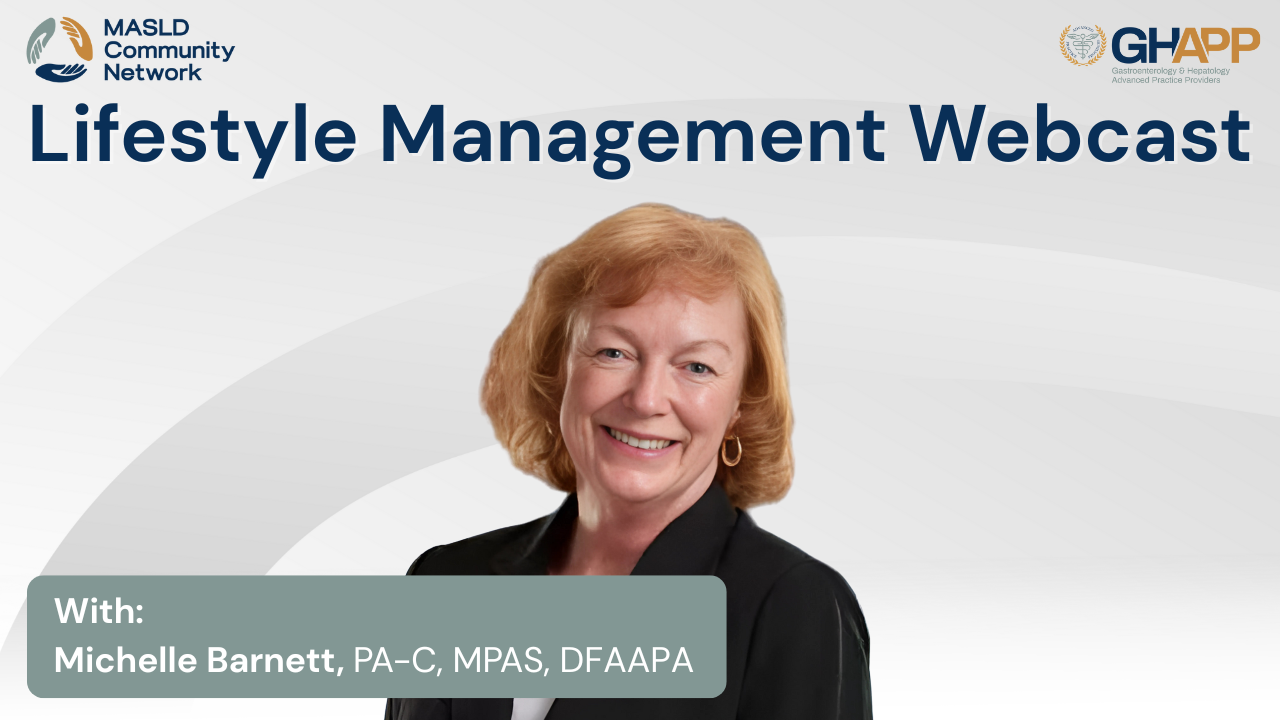
Lifestyle Management With Michelle Barnett

Join Michelle Barnett, PA-C, for an in-depth clinical case presentation as part of the GHAPP MASLD Community Network. With over 25 years of experience in GI and hepatology, Michelle walks through the real-world management of Albert, a 65-year-old patient newly diagnosed with MASLD (Metabolic Dysfunction-Associated Steatotic Liver Disease). In this session, she outlines key diagnostic criteria, the role of non-invasive tests (NITs) like FIB-4 and FibroScan, and how to risk-stratify patients using updated care pathways. Learn how to differentiate low-, moderate-, and high-risk cases and when to refer for hepatology evaluation or consider biopsy. Michelle also explores the clinical role of Resmetirom—the first FDA-approved medication for patients with MASH and F2-F3 fibrosis—and emphasizes the importance of sustained lifestyle modification, dietary change, and exercise in liver disease management. This expert discussion includes cultural and socioeconomic considerations, adherence strategies, and patient tools like the Exercise and Diet Adherence Scale. Visit the GHAPP MASLD Community Network for more resources, disease-state education, and updates on the evolving care landscape. Educational content supported by Madrigal Pharmaceuticals.
Watch Now
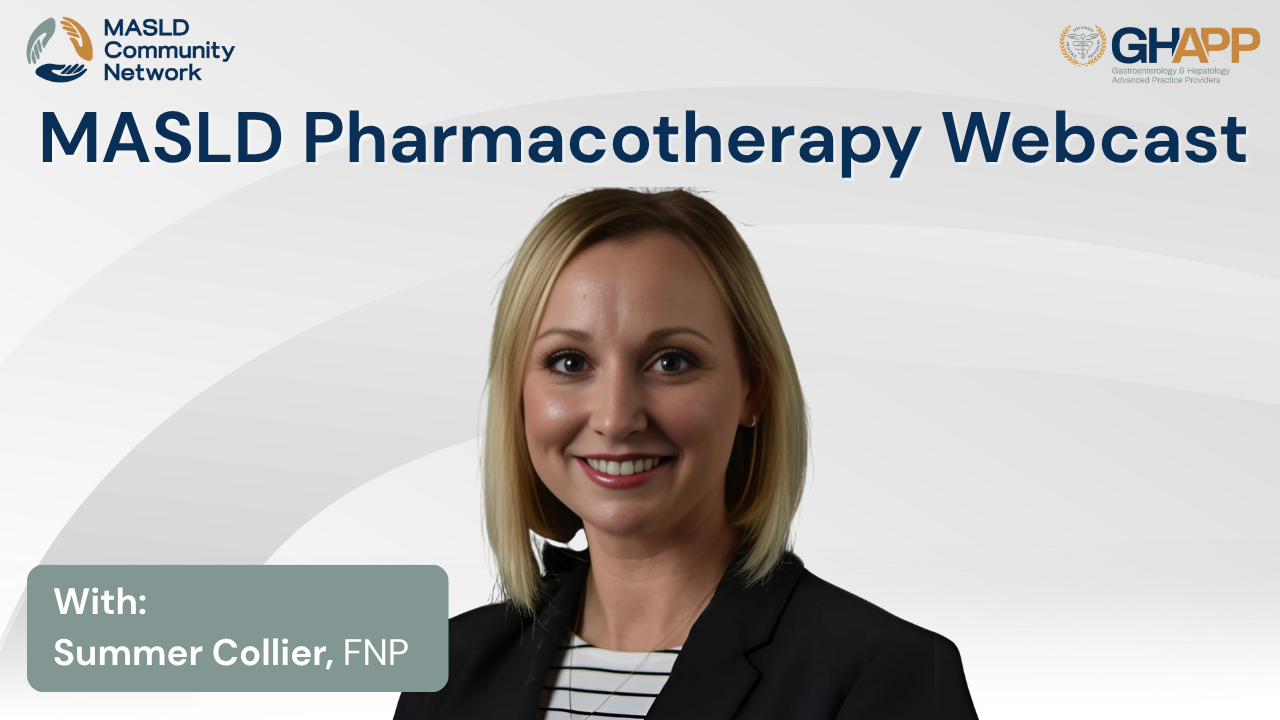
MASLD Pharmacotherapy With Summer Collier

Join Summer Collier, NP for a clear, clinic-ready overview of MASLD pharmacotherapy. This session explains why management starts with the metabolic syndrome—targeting obesity, type 2 diabetes, hypertension, and dyslipidemia—while reinforcing that lifestyle change (diet, physical activity, and 7–10% weight loss) remains the cornerstone. Summer reviews the role of GLP-1 receptor agonists (e.g., semaglutide, tirzepatide) for weight reduction and glycemic control—including the anesthesia precaution to hold GLP-1 therapy 7 days before endoscopic procedures—and outlines liver-directed options: vitamin E (select non-diabetic patients, risks/limits), pioglitazone (cardiometabolic benefits vs. weight gain/edema considerations), and the first FDA-approved therapy for non-cirrhotic MASH with F2–F3 fibrosis, resmetirom (THR-β agonist targeting hepatic fat and inflammation). You’ll also hear practical tips on patient selection, staging and restaging with noninvasive tests (FIB-4, FibroScan®/elastography, MRI-PDFF, ELF), coordinating weight-management referrals, and planning follow-up. Ideal for GI/hepatology clinicians and APPs seeking an up-to-date, evidence-based roadmap to treat fatty liver disease and prevent progression to advanced fibrosis.
Watch Now
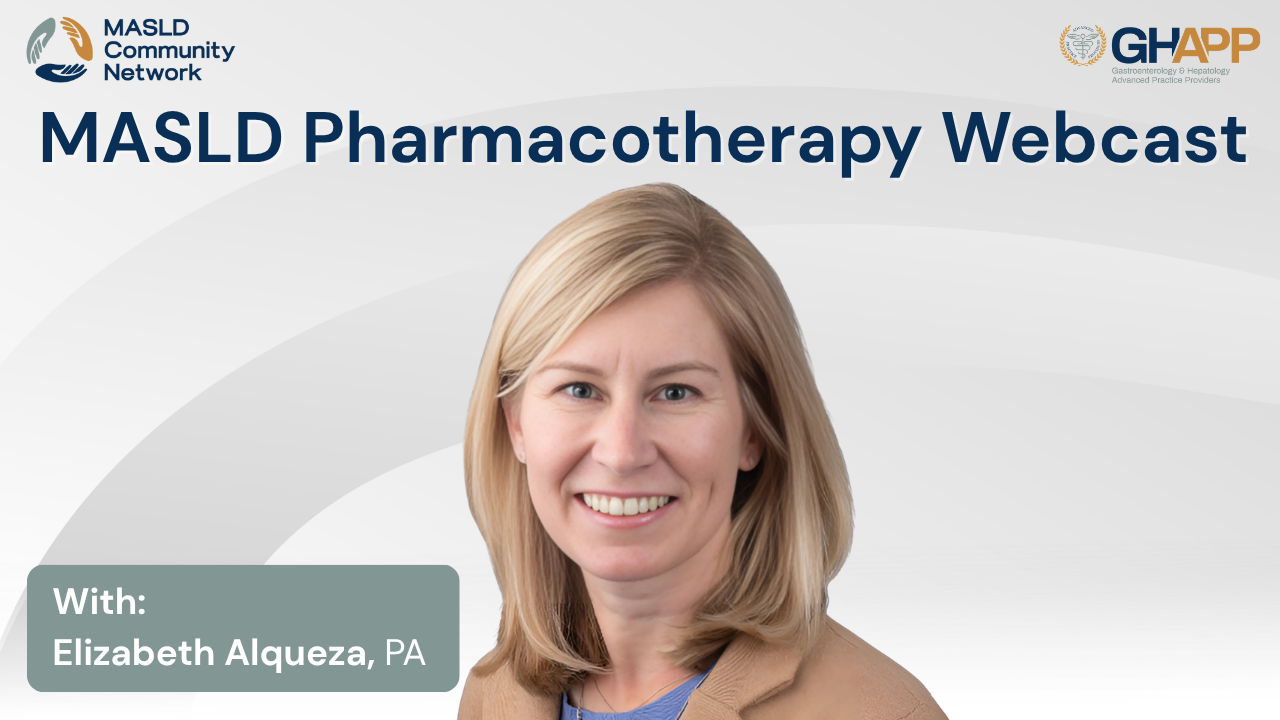
MASLD Pharmacotherapy With Elizabeth Alqueza

In this presentation, Elizabeth Alqueza, PA at Beth Israel Deaconess Medical Center, provides a comprehensive overview of pharmacotherapy for Metabolic Dysfunction–Associated Steatotic Liver Disease (MASLD) and MASH. She highlights the latest treatment strategies, including lifestyle modifications, cardiovascular risk reduction, and targeted liver-directed therapies. Elizabeth reviews the role of GLP-1 receptor agonists in weight loss and liver health, the evidence for Vitamin E and Pioglitazone in select patients, and the landmark approval of Resmetirom (Rezdiffra)—the first FDA-approved therapy for MASH with moderate to advanced fibrosis. Drawing from clinical trial data, including the MAESTRO-NASH trial, she explains mechanisms of action, efficacy outcomes, safety considerations, and practical prescribing guidance. This session underscores the importance of combining non-invasive testing, lifestyle interventions, and emerging pharmacologic therapies to improve patient outcomes and prevent progression to cirrhosis and liver-related complications.
Watch Now

APP Insight: Common Questions from Patients About MASH

In this video, Jonathan Yeh, PA, answers three of the most frequently asked questions about MASH—Metabolic Dysfunction–Associated Steatohepatitis—and offers practical advice for understanding and managing this progressive form of fatty liver disease. He begins by explaining what MASH is: an inflammatory, more advanced stage of MASLD (Metabolic Dysfunction–Associated Steatotic Liver Disease), driven by abnormal fat accumulation in the liver due to impaired fat transport. Jonathan then breaks down the treatment approach, emphasizing the importance of lifestyle modification—particularly diet and exercise. He highlights the benefits of a green Mediterranean diet, regular physical activity, and sustainable weight loss, which can improve or even reverse MASH in many patients. For individuals with more advanced fibrosis, pharmacologic treatment with resmetirom (Rezdiffra) may be indicated. This concise FAQ offers helpful guidance for patients and providers alike on tackling MASH with evidence-based strategies.
Watch Now
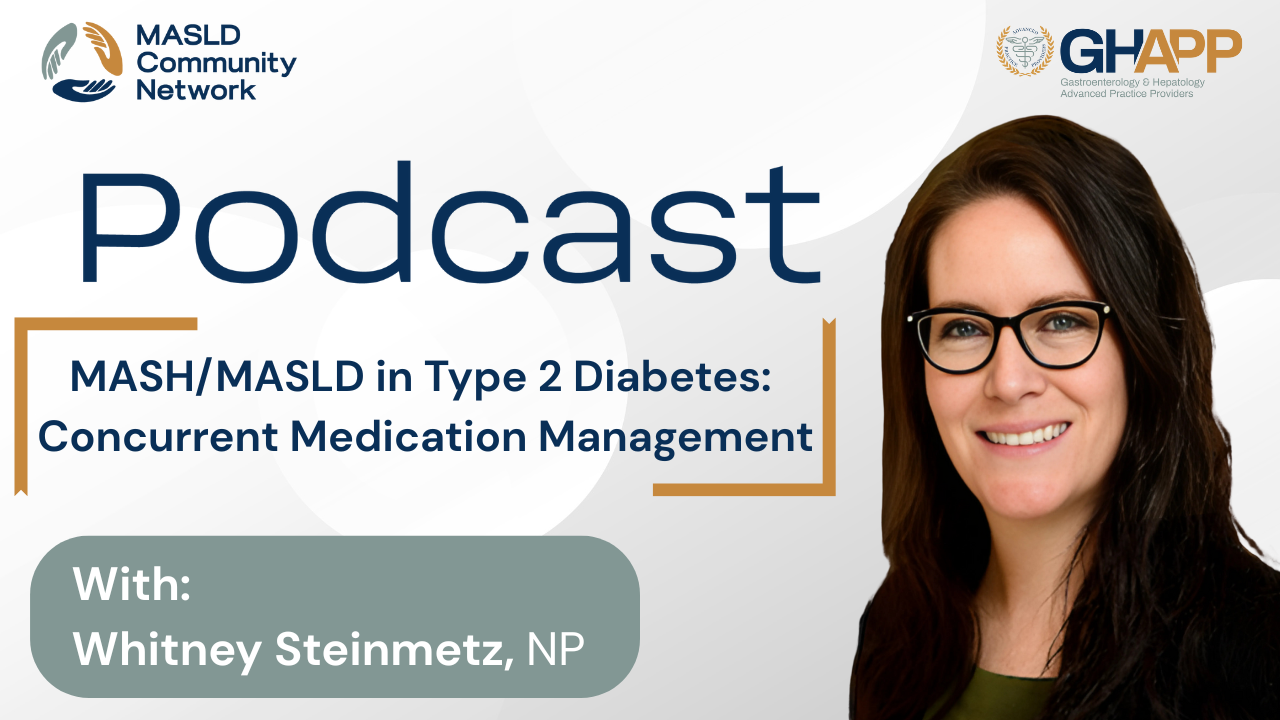
MASH/MASLD in Type 2 Diabetes: Concurrent Medication Management

In this informative episode, Whitney Steinmetz, NP from Presbyterian Medical Group in Albuquerque, NM, explores how to optimize medication strategies for patients with type 2 diabetes who are also living with MASLD and MASH. She discusses why individuals with type 2 diabetes are at significantly higher risk for developing advanced liver fibrosis—highlighting the overlapping metabolic, inflammatory, and insulin-resistant pathways that accelerate liver damage. Whitney breaks down how commonly prescribed diabetes medications—like GLP-1 receptor agonists, SGLT2 inhibitors, TZDs, and dual/triple incretins—impact liver fat, inflammation, and fibrosis progression. She offers practical guidance on selecting therapies that balance glycemic control with hepatic benefits while minimizing polypharmacy. Learn which medications may offer dual cardiometabolic and hepatic advantages, and which should be avoided or used with caution in patients with cirrhosis or advanced fibrosis. Tune in for real-world insights into how advanced practice providers can take ownership of MASH management in diabetes care.
Watch Now

HCC Surveillance: Implementation in Patients With Advanced Fibrosis/Cirrhosis From MASH

Learn when and how to effectively screen for hepatocellular carcinoma (HCC) in patients at risk, especially those with metabolic dysfunction-associated steatotic liver disease (MASLD). In this informative video, Maribeth Capuno, an adult nurse practitioner at the Richmond Veterans Affairs Medical Center, shares her clinical approach to early HCC surveillance. While AASLD guidelines recommend screening only after cirrhosis has been diagnosed, Maribeth highlights the growing evidence that patients with stage 3 fibrosis can still develop liver cancer—and why she begins surveillance earlier. She discusses the recommended tools, including liver ultrasound every six months and alpha-fetoprotein testing, and explores practical workflow tips to ensure patients remain adherent. Learn how imaging modalities like MRI and CT with liver protocol, along with tools like LI-RADS and tumor board consultations, contribute to timely and accurate diagnosis. The video also emphasizes key risk factors—such as obesity, diabetes, viral hepatitis, and lifestyle behaviors—and how managing these can help prevent the progression to HCC.
Watch Now
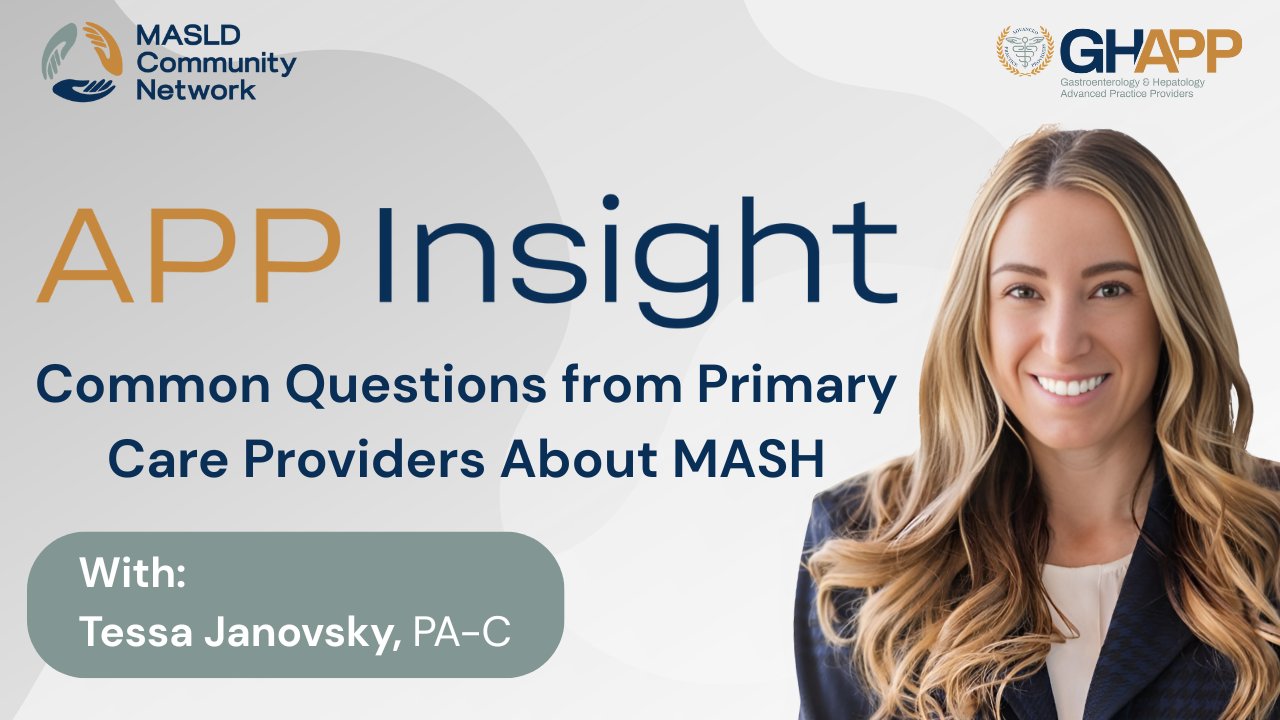
Common Questions From Primary Care Providers About MASH

In this MASLD and MASH Community Network, Tessa Janovsky, PA-C at Arizona Liver Health, answers common questions from primary care providers about Metabolic Dysfunction–Associated Steatohepatitis (MASH) and its updated terminology. She explains why MASH has replaced the term NASH, highlighting the shift to reflect underlying metabolic drivers such as obesity and type 2 diabetes while removing stigmatizing language. Tessa discusses how normal or mildly elevated liver enzymes do not rule out MASH, the importance of screening high-risk groups—including patients with diabetes, obesity, metabolic syndrome, or incidental fatty liver on imaging—and why the FIB-4 score is the preferred first-line test for fibrosis risk assessment. She also reviews the first FDA-approved medication for MASH, resmetirom, as well as the role of GLP-1 therapies and upcoming treatment options. Whether you’re a clinician seeking updated screening guidelines or a patient wanting clarity on diagnosis and management, this session provides clear, evidence-based guidance on identifying and treating MASH.
Watch Now

Addressing Health Disparities: Equity Considerations in MASH/MASLD Care

In this powerful and timely episode, Robin Soto, FNP at UC San Diego Health, explores the deep-rooted health disparities impacting patients with MASH (metabolic dysfunction-associated steatohepatitis) and MASLD (metabolic dysfunction-associated steatotic liver disease). With a focus on equity in liver care, Robin highlights the disproportionate burden of disease in Hispanic and underserved populations and the complex interplay of genetics, socioeconomic status, healthcare access, and systemic bias that drives these outcomes. She shares actionable strategies for advanced practice providers (APPs) to implement culturally sensitive communication, bias-conscious screening protocols using tools like FIB-4, NAFLD fibrosis score, and transient elastography, and how to leverage telehealth and community partnerships to bridge gaps in care. Robin also addresses the importance of culturally relevant dietary counseling, inclusive family engagement, and motivational interviewing to enhance adherence and improve long-term outcomes. Whether you're in primary care, hepatology, or community health, this episode offers a roadmap to advance health equity in the management of fatty liver disease.
Watch Now

Podcast: Pharmacotherapy for MASH/MASLD: An Overview

In this comprehensive episode, Christina Hanson, FNP-C at South Denver GI, provides an in-depth overview of pharmacotherapy for MASLD and MASH, with a focus on the FDA-approved therapy resmetirom (brand name Rezdiffra). Drawing on over 18 years of experience in hepatology and GI care, Christina explains the histologic endpoints used in clinical trials—MASH resolution and fibrosis improvement without worsening disease—and how they guided the approval of resmetirom. She breaks down the drug’s mechanism of action as a selective thyroid hormone receptor beta (THR-β) agonist, which promotes lipid metabolism and reduces liver inflammation without systemic toxicity. Christina reviews key Phase 3 data from the MAESTRO-NASH trial, showing resmetirom’s significant impact on both MASH resolution and fibrosis regression across diverse patient populations. She also outlines criteria for appropriate patient selection (those with stage F2-F3 fibrosis), clinical monitoring strategies, and management of side effects like transient GI discomfort. Christina emphasizes the importance of baseline screening for liver disease, autoimmune conditions, thyroid function, and lipid levels before initiating therapy. She highlights best practices from the 2024 AASLD guidelines for ongoing monitoring and treatment response assessment, including ALT and liver stiffness thresholds that help determine whether to continue or discontinue therapy. This episode is a must-watch for hepatology clinicians looking to implement evidence-based, patient-centered strategies in the management of MASH.
Watch Now

Lifestyle Management With Milly Ng

Join Milly Ng, NP, a hepatology nurse practitioner at Tufts Medical Center in Boston, for an evidence-based session on lifestyle management for MASLD and MASH, presented through the GHAPP MASLD Community Network and sponsored by Madrigal Pharmaceuticals. Through the case of "Albert," a patient with steatosis and metabolic risk factors, Milly highlights the importance of personalized counseling and non-invasive testing like FIB-4 and FibroScan to assess fibrosis risk. She reviews how Metabolic Dysfunction-Associated Steatotic Liver Disease (MASLD) and its progressive form, MASH, can be reversed through diet, exercise, and weight loss, particularly before fibrosis advances to cirrhosis. Learn how to tailor dietary guidance to a patient's cultural background, socioeconomic status, and personal goals, and understand how central obesity and insulin resistance drive disease progression. Milly also reviews the genetic and environmental factors influencing steatosis, why aerobic training may be more effective than resistance workouts for liver health, and how validated tools like the EDAS (Exercise and Diet Adherence Scale) can track patient progress. This session empowers primary care and hepatology providers to deliver patient-centered lifestyle interventions that can prevent liver disease progression and reduce cardiometabolic risk.
Watch Now





 August 2025
August 2025 